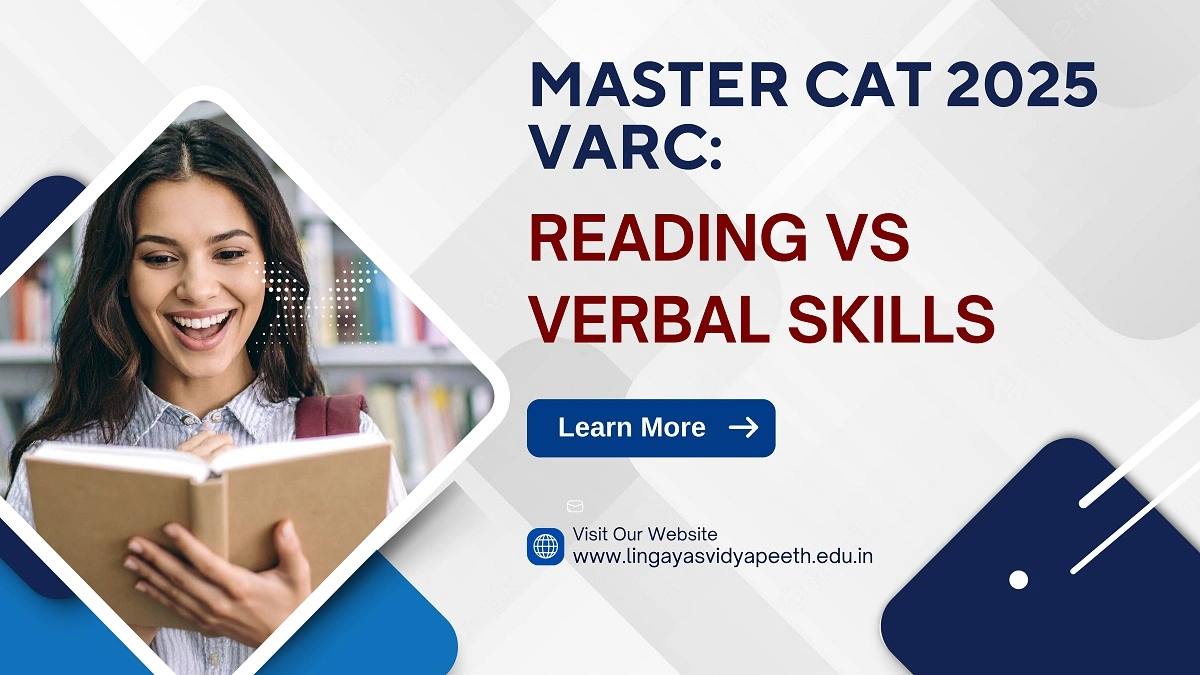Home » Master CAT 2025 VARC: Reading vs Verbal Skills

Hey future MBA stars! Are you preparing for CAT 2025 and feeling nervous about the VARC section? You’re not alone. The Verbal Ability and Reading Comprehension (VARC) part of CAT often feels tricky, even for students who speak English fluently. It’s not just about knowing the language — it’s about thinking critically, reading smartly, and managing time wisely.
Don’t worry — this guide breaks down everything you need to know about VARC, how Reading Comprehension (RC) differs from Verbal Ability (VA), and practical strategies to help you score big. Let’s make VARC your strongest section!
The CAT 2025 exam is scheduled for November 30, 2025, and lasts 120 minutes. Out of these, you’ll get 40 minutes for the VARC section, which consists of 24 questions. The section usually includes both multiple-choice and type-in-the-answer (TITA) questions.
Here’s where many students make a mistake — they assume English will be the easiest section since they use it every day. But CAT’s VARC isn’t about casual language; it’s about your ability to analyze ideas, interpret tone, and structure arguments logically.
In fact, many toppers say VARC can make or break your percentile. In previous years, those who hit the 99th percentile often excelled in VARC. Since Reading Comprehension carries around 16 questions and Verbal Ability takes the remaining 8, mastering both is crucial for a high overall score.
So, if you’ve been focusing only on Quant or DILR, it’s time to give VARC the attention it deserves.
Reading Comprehension dominates VARC — roughly two-thirds of the questions come from RC. You’ll face around four passages, each followed by four questions. These passages can cover anything — from psychology to history, from economics to environmental studies.
Questions often ask you to identify the main idea, draw inferences, or recognize the author’s tone. RC isn’t just about reading fast; it’s about reading smartly — identifying the structure, key arguments, and underlying logic.
Here’s how to strengthen your RC game:
The more you read, the more comfortable you become with complex ideas — a skill that helps beyond the CAT too.
The remaining 34% of VARC is made up of Verbal Ability (VA). It includes questions on para jumbles, odd-one-out, summaries, and sometimes grammar-based tasks. VA might seem smaller in number, but it’s often more time-consuming because it requires intuition and precision.
Here, your goal isn’t just to know grammar rules — it’s to understand sentence flow and logic.
Remember, strong reading habits indirectly improve your VA performance because both rely on comprehension and logical flow.
Though RC and VA look different on the surface, they’re deeply linked. RC deals with long passages and big-picture analysis, while VA involves shorter, focused questions on sentence order and logic.
However, both require:
A simple truth: students who read regularly tend to perform better in both sections. Studies and CAT prep data show that aspirants who read 500+ words daily score nearly 20% higher in VARC.
Instead of preparing separately, blend your practice — start with RC to build stamina and concentration, then move to VA for accuracy and speed.
Here’s a realistic and effective prep plan you can follow starting today:
Join online study groups to discuss tricky passages or confusing VA sets. Talking through problems often makes concepts stick.
Also, consider referring to reliable books like How to Prepare for VARC for CAT by Arun Sharma — it’s a favorite among CAT aspirants.
Track your progress every week. Small improvements add up to big results over time.
VARC isn’t a section to fear — it’s a skill you can train and sharpen. Think of Reading Comprehension and Verbal Ability as teammates working together. The more consistent and curious you are, the faster you’ll improve.
CAT 2025 is your opportunity to shine. Start now, stay disciplined, and believe in your potential. High VARC scores don’t just open doors to IIMs — they also make you a clearer, more confident communicator for life.
So grab a cup of coffee, open that article, and start reading. You’ve got this!
Also Read
What Does GST 2.0 Mean for Students?
AICTE Industry Fellowship 2025: Know the Eligibility
Polynomial Regression in Machine Learning
Top 10 Free Web Development Courses for Beginners in India
RECENT POSTS
CATEGORIES
TAGS
Agriculture Agriculture future AI Architecture artificial intelligence Bachelor of Commerce BA English BA Psychology BTech AIML BTech CSE BTech cybersecurity BTech Engineering Business management career Career-Specific Education career guide career option career scope Civil engineering commerce and management Computer Science Computer science engineering Data science degree education Engineering Engineering students English Literature english program Fashion Design Fashion design course Higher Education Journalism journalism and mass communication law Law career Machine Learning mathematics MBA MBA specialization Mechanical Engineering Pharmacy Psychology Research and Development students
Lingaya's Vidyapeeth (LV) only conducts physical/online verification of any document related to examination on the following official email IDs:
It is important to note that the following email IDs and domains are fraudulent and do not belong to our university:
Please do not respond to or share any personal information with these fraudulent sources.